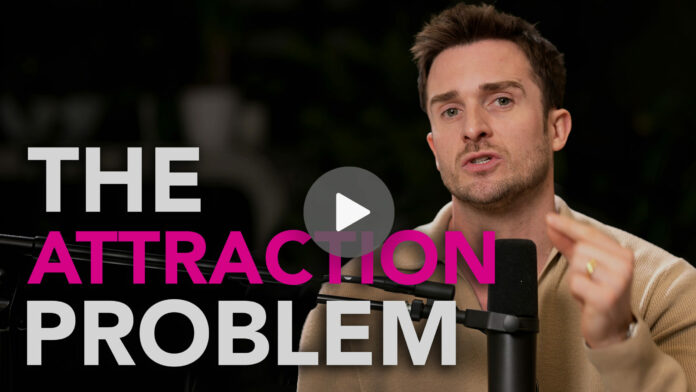Have you ever tried to keep someone’s attraction by “playing the game”?
Maybe you’ve been tempted to respond less to texts, or try to hide the fact you like someone, or followed dating advice that tells you to act aloof and indifferent. In today’s video, I want to get to the truth about “playing hard-to-get” and what really happens when you try to win attraction by playing games.
What do you do when you feel like playing games with someone actually works, or at the very least, it works better than healthy communication? One of my Love Life Club members sent in a question in the last few days and I thought it was really really interesting.
She said, “I was reading some relationship books before being exposed to the Love Life Club. I personally identify more with the open communication style in Matthew’s approach, but some of the experts, for example, Why Men Marry Bitches, promote silent punishment instead of transparent communication. These experts say that men do not respond to words, but to actions, and do not react well to communication about one’s emotions. What is your take on this? Sometimes when women are vulnerable, when should we play a game, and when should we be honest and transparent?”
This question makes me sad in a sense, because it reflects this feeling of “I can’t just be myself. I have to play some kind of a game to get this person’s attention.”
That’s interesting to me. Because when I think of transparent communication, I think of conveying to someone that if they’re not being consistent, if they’re not investing, if they’re going hot and cold, it would be saying to that person, “Hey, I was initially excited about where this was going, but I haven’t really felt your attention for the last few weeks. And I know you want to see me now, but I kind of backed off because I just didn’t really feel your interest.”
That isn’t giving up power. That’s being very honest about the fact that you were interested in them, but you’ve actually become less interested in them . . . since they’re not trying, since they violated a boundary or a standard of yours. What I hear in this question is someone saying, “I’m afraid that if I’m honest about how I feel, I’m going to give up my power, because how I feel is that this person is awesome. And I really want them. My opinion of them has not changed based on their lack of investment or their poor behavior. My opinion of them is exactly the same. My conclusion is the exact same conclusion: I want them. So if I’m honest with them, it’s going to come out as some version of: ‘I really want you and I’m upset because you’re not giving me as much as I want. But I really want you.’”
Can you hear the headline in that? The headline is: “I really want you and it doesn’t really matter that you’ve hurt me. Just tell me that you want me back.”
The headline has to change. The headline should be: “I was excited about you, but I’m actually a lot less excited. Maybe I’m not excited at all anymore based on your lack of investment.”
If you’re wondering what gives more challenge . . . the silent treatment, which is essentially just another game that I play that’s going to attract an unhealthy person who responds to such a game . . . or being honest about what I want and who I am . . . well, I say that being honest about what you want and who you are can be the challenge that attracts someone if it communicates a standard. The standard is the challenge. The game cannot be the challenge.
Because if your game is the challenge, you’re going to attract someone who’s attracted to games, and then you’re in the game with them and you’re only challenging to them as long as you’re playing that game. The moment you stop playing that game, you stop being challenging, and that person won’t want you anymore. But if you find the person who’s attracted to your standard and the challenge that that represents, then that attraction will last. That attraction is based on your actual standards.
What I’m really talking about is healthy communication. Healthy communication about what you want and being honest about the fact that you want someone less if they’re giving you less. What will happen is that that person, depending on what their intentions are, how healthy of a partner they are, how healthy their mindset is around dating, what their own insecurities are, they will have one of three different reactions.
The first person is the person who, when you assert a standard, backs off, and they back off because they’re like, “I don’t want to . . . I’m not interested in the same things you’re interested in. You clearly want more than just a casual fling, and I’m not in the market for that. So I’m going to back off.”
The second kind of person is the person who, when you assert a standard and you say, “I’m not as interested anymore,” that person starts showering you with attention because they’re unhealthy and they just want to win you back.
And the third kind of person is the person who sees your standard and sees a bar that they want to actually raise their game to, and they say, “I’m going to give you more because I actually like what you represent.”
To me, the issue contained in this question is that this person feels if they are honest, they’re going to lose their power. And you have to ask: “Why is it that I associate being honest with losing my power? Could it be that I don’t actually think I have power in the first place? What I want is for this person to like me and want me. I have already made up my mind that this person is valuable to me. And if I’m honest with them about just how valuable they are to me, they’re going to lose interest because they’re gonna see that they have all the cards.”
If you’re starting with that frame of reference in your mind, then it’s true. And all you’re really afraid of is that the truth will come out. But what if there was a different truth born out of a healthy mindset to begin with? It could be:
“I was excited about this person at one point, and then they stopped trying. Then they became hot and cold. They became flaky. They weren’t consistent anymore. They made me question whether they liked me at all because of how long they would go without texting me or calling me or asking me on another date. And that’s what made me detach. It made me back off. I’m not as interested anymore. It’s not making me detach from a place of: ‘Let me punish them or let me employ a tactic of the silent treatment so they see I hold the cards.’ No, it’s just I’m less interested because I don’t feel this person’s warmth, connection, and communication anymore. I don’t feel any sense of progression. So I’ve started to devalue this person’s worth in my life.”
We’re not not devaluing their worth as a person, but it’s never about what someone’s worth is as a person, is it? It’s about how much worth someone has to us as a partner.
When someone stops trying, they have to be downgraded in their importance in our life. Now, if that’s the truth, if that’s your new truth, that “this person isn’t trying anymore, so I’m downgrading their importance in my life, and maybe to the point where I don’t even know if I see the point in meeting up again . . .” If you communicate that to a person when they reach back out, you’re not giving up your power, you’re claiming your power.
Your challenge there doesn’t come from the fact that you’re playing a game with someone and it’s challenging. The challenge is embedded in the standard that you have, whereby someone realizes: “I either have to step my game up and try with this person, or this person is not going to give me the time of day.” That’s the challenge.
It’s a complete misnomer, the idea in this question of, you know, “The experts say that men don’t respond well to communication about one’s emotions and all of that.” This is not a bunch of communication about one’s emotions. This is about you saying: “What’s worth my time, and what’s not worth my time?”
There’s nothing particularly sentimental and emotional about that. That’s not getting a man lost in a conversation where he’s saying, “Oh my God, this is so emotional!” It’s saying to someone right now, “Right now, you’re not showing yourself to be worth my time, and I’m just being honest with you about that. There’s no game there. This is how I feel.”
And by the way, the only way that this kind of healthy communication will produce real results for you and your love life is if you follow it through to the end. It cannot be just another version of a tactic that we employ, because I think that if I send you this very clever message about how you’re not giving me what I need, and therefore I’m starting to be less interested and so on, then all of a sudden, I’m gonna get your attention. Because that’s just another tactic. It’s not about tactics, it’s about standards.
Tactics are what we use to get a short-term result. Standards are who we are.
Standards are how we live, and the standard means that if you were to be honest with someone in this way, and then they backed off as a result because they realized you want more than they do, or you’re on a different path than them, then you’re happy they backed off. You don’t two days later suddenly reach out to them and go, “So what are you up to today?” Because you’re like, “Oh, it didn’t work. They backed off even more. I now need to reach out again because I don’t want to lose them.”
No, that’s losing your standard again. The standard is: “I’m not interested in this person if they’re not trying.”
So if they back off, your standard stays the same: “Okay, they proved me right. They’re not worthy of my attention.” If you communicated with someone in this way, and then they all of a sudden doubled down on the energy they gave you and they were like, “Let me call you tonight. Let me have a three-hour conversation with you. Let’s spend the whole weekend together. I’ll fly out to you next week.”
If they do that, having a standard is also not getting too excited about that. Because you realize that you’ve been here with this person once before already. They gave you lots of attention and then it dropped off the map.
So in order to find this new attention that you’re getting interesting, it needs to be consistent. You have to follow the standard through to the end. But the only way you can do that is to be congruent with this standard that you’re communicating. You have to believe it. It has to be your actual truth. And that comes from having a healthy approach to dating in the first place. Not using a healthy approach tactic, but actually having a healthy approach, which means healing our wounds, which means figuring out:
“Why is it that I’m asking a question about how to attract essentially a dismissive avoidant person? Why is someone like this even on my radar? In fact, why do I keep coming across people like this? Why do I keep getting far enough in with a person like that to where I have feelings and I’m gonna get hurt? How do these people get through the door? What’s happening with me? What pattern am I repeating over and over and over again in my love life that keeps causing me pain, that keeps attracting me to the game-players, that keeps attracting me to the people who are emotionally unavailable, who aren’t ready? What is happening here?”
And that’s where self-accountability comes in. And it’s a road we all have to take. I had unhealthy patterns in my dating life. At a certain point, I had to go, “What’s going on with me here that keeps making me attracted to the wrong things? What’s going on here that I keep getting myself into situations where either I get hurt or they get hurt, but no one’s happy? I never find peace. I’m never satisfied. What’s happening here?”
And if you’re feeling that way, and you want to actually do that deeper work to heal and become emotionally healthy in this area so that you can be congruent with those standards on the outside, I have a process where you can do it with me.
I’m doing a six-day event in September, my Retreat. I’ve been running it for 15 years and we’re going to be meeting a whole group of people out in Florida, and I’m going to be coaching them in an immersive way for six days.
So if you want to come and do it with us, you can do that. The link is mhretreat.com. But even if you don’t do it with me, this is work that if you do it, it fundamentally changes what you’re drawn to in your dating life. It fundamentally changes who has your attention and how you respond to people. And that will change your dating life forever.
So I invite you to do that work with me, without me, it doesn’t matter, but that work is for so many of you out there, the most important thing that you could possibly be doing right now, and I want to make more videos about this this year. Leave me a comment. Let me know what you want me to talk about, how you want me to expand on this topic. Where would you like this to go next?
And like I said, if you want to join me in September, it’s a live event. It’s a Retreat. So there are literally a limited number of seats. It’s a first-come, first-served event, so if you know you’re interested in that, now is the best time to apply: mhretreat.com is the link for that. Thank you so much for watching, and I’ll see you next time. I look forward to reading your comments.
matthewhussey.com







